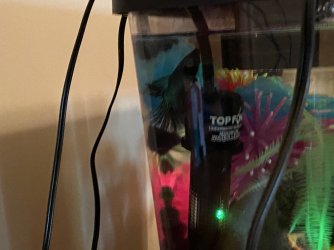am not sure if this is the right spot to post but I just am hoping I can get an answer in a fairly quick amount of time. I discovered this forum while trying to Google my bettas symptoms. To explain as brief I can, basically I got a half moon tail betta not even a month ago and noticed when I got him he had white stringy poop, at the time I though nothing of it. I just read however that it could be a sign of parasites, and parasites could lead to the same symptoms as swim bladder disease, which is what I’m seeing in him. I haven’t noticed any more hanging poop since I’ve had him however I have white gravel. Also, his symptoms have gotten so bad to where he can’t swim at all he’s laying on the bottom of the tank and when he tries to swim, his tail drags him back down. I’ve been fasting him for almost 3 days and was going to give him a pee afterward (as this could be swim bladder from overfeeding, when I got him he refused to eat for a week so I kept adding it and should have sucked up what fell because I think he has now eaten all the food from those five days. I raised the temperature of the tank , keeping it at 82, but he can’t swim normally at all and I’m wondering if I need to treat him for parasites just in case? Since he did have the white stringy poop and He’s gotten so bad. I’ve placed betta hammocks and other plants all over so he can use them to rest near the surface.
His behavior is not lethargic though, other than him laying on his side when no one is near but when I go to the tank he almost gets oddly excited thinking he is getting food. I wish it would let me post a video so you could see, it’s hard to capture how bad his symptoms are in still pictures. I noticed he’s even trying to eat stuff off the gravel and plants now, like he’s desperate, which that hunger to me says parasites too. He really doesn’t look too bloated, I’ve seen swim bladder multiple times and I have never had it where their tail is pulling him down and when he tries to rest on a plant he his spine curves and he topples over.
So much for brief, but I guess right now, my question is will it be harmful to treat him for parasites if he doesn’t have them? The fact that he’s acting like he’s starving and that I don’t see any brown poop on the white rocks... along with his worsening condition despite being on the third day of his fast? The stores close soon so I hope to get a response quickly but I know that’s no realistic. I’ll probably just buy the treatment and see what you all have to say . My bettas have always lived two years at the minimum, the longest lived 5 years, so seeing him go downhill after a month is upsetting. If he had the stringy poop a month ago when I got him and he’s now this bad, had I know white poop meant that I wouldn’t have ignored it obviously. The fact that I see zero poop on the gravel is also a bit of a red flag. So I’m hoping you experts can help and educate me, could this be from parasites or is it just swim bladder ?





His behavior is not lethargic though, other than him laying on his side when no one is near but when I go to the tank he almost gets oddly excited thinking he is getting food. I wish it would let me post a video so you could see, it’s hard to capture how bad his symptoms are in still pictures. I noticed he’s even trying to eat stuff off the gravel and plants now, like he’s desperate, which that hunger to me says parasites too. He really doesn’t look too bloated, I’ve seen swim bladder multiple times and I have never had it where their tail is pulling him down and when he tries to rest on a plant he his spine curves and he topples over.
So much for brief, but I guess right now, my question is will it be harmful to treat him for parasites if he doesn’t have them? The fact that he’s acting like he’s starving and that I don’t see any brown poop on the white rocks... along with his worsening condition despite being on the third day of his fast? The stores close soon so I hope to get a response quickly but I know that’s no realistic. I’ll probably just buy the treatment and see what you all have to say . My bettas have always lived two years at the minimum, the longest lived 5 years, so seeing him go downhill after a month is upsetting. If he had the stringy poop a month ago when I got him and he’s now this bad, had I know white poop meant that I wouldn’t have ignored it obviously. The fact that I see zero poop on the gravel is also a bit of a red flag. So I’m hoping you experts can help and educate me, could this be from parasites or is it just swim bladder ?




 the number one cause of it is over feeding because it causes digestive issues and too much gas to build up, especially from cheaper foods that contain air.
the number one cause of it is over feeding because it causes digestive issues and too much gas to build up, especially from cheaper foods that contain air.